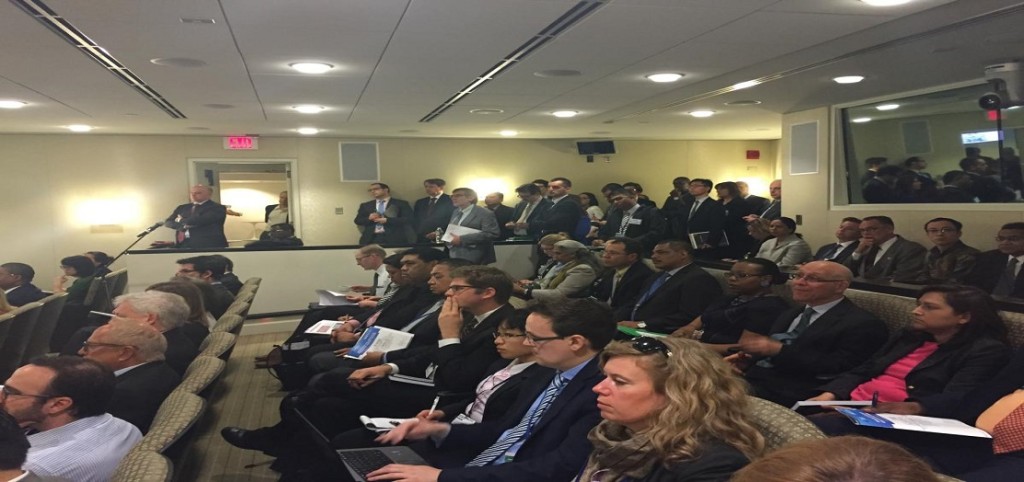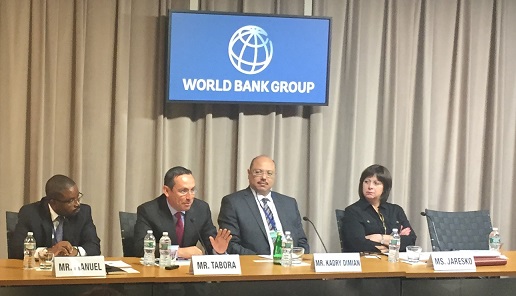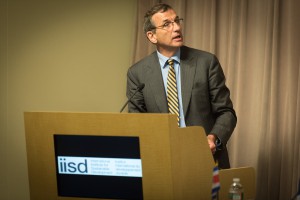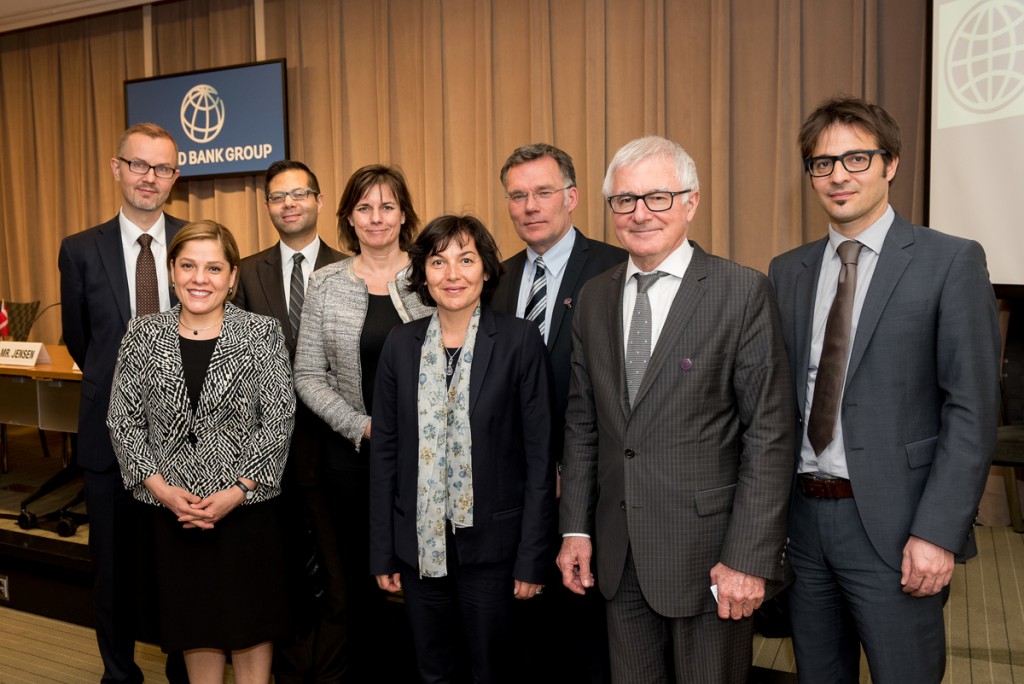Timely seminars and high level events help promote reform. Events are ordered chronologically and include an impressive number of influential speakers from around the world.
Fossil Fuel Subsidy Events at the IMF and World Bank Spring Meetings

The Global Subsidies Initiative (GSI) supported a group of 8 countries―known as the Friends of Fossil Fuel Subsidy Reform (Friends)―in organizing two high-level events at the Spring Meetings of the IMF and the World Bank. The Friends group consists of Costa Rica, Denmark, Ethiopia, Finland, New Zealand, Norway, Sweden and Switzerland.
Thursday April 16
The Friends organized a ministerial-level event on fossil fuel subsidy reform (FFSR) in cooperation with the United States and the World Bank.
Opening speakers included Laura Tuck, Vice-President, Europe and Central Asia Region, World Bank Group and Michelle Patron, Special Assistant to the President and Senior Director for Energy and Climate Change in the U.S. White House.
In her opening remarks, Laura Tuck highlighted the need to mitigate impacts on vulnerable groups of society when implementing reforms. Michelle Patron talked about the ongoing U.S. process to submit an inventory of its subsidies to peer review with China and underlined the importance of transparency as a means to increase awareness and advance reform efforts. Michelle Patron also extended gratitude to the Friends of Fossil Fuel Subsidy Reform for consistently raising the issue of FFSR and for helping to organize the event.
The main focus of the event was a panel discussion designed to share country experiences in implementing energy subsidy reforms and exchange views on critical challenges of reform and effective ways to address them. The panelists included:
- Mr. Armando Manuel, Minister of Finance , Angola
- Mr. Marlon Tabora, President of the Central Bank, Honduras
- Ms. Natalie Ann Jaresko, Minister of Finance, Ukraine
- Mr. Hany Kadry Dimian, Minister of Finance, Egypt
The panel discussion provided refreshing and constructive input to a number of issues relating to country experiences with energy subsidy reform.
The Finance Minister of Angola, Mr. Manuel, pointed to Angolan challenges around social and inflationary impacts from reform as well as challenges related to political and popular opposition towards reform.  These issues prompted the Angolan government to undertake information campaigns prior to implementing reforms and Mr. Manuel also underlined the significance of timing and linking subsidy reform to larger macroeconomic or social initiatives. From an Angolan perspective, fossil fuel subsidy reform worked better when treated not as a stand-alone issue, but as part of a more comprehensive and society-wide reform package.
These issues prompted the Angolan government to undertake information campaigns prior to implementing reforms and Mr. Manuel also underlined the significance of timing and linking subsidy reform to larger macroeconomic or social initiatives. From an Angolan perspective, fossil fuel subsidy reform worked better when treated not as a stand-alone issue, but as part of a more comprehensive and society-wide reform package.
Next in line was Mr. Marlon Tabora, President of the Central Bank in Honduras. Mr. Tabora drew several lessons from recent reform efforts in Honduras with the most prominent lesson being the need for creating broad political ownership around reform. According to Mr. Tabora it is important that subsidy reform is not only embedded within one or two ministries, but across the government as a whole.
Ms. Natalie Ann Jaresko, Minister of Finance of Ukraine, ironically noted the paradox of Ukraine advising other countries on subsidy reform despite of its vast history of energy subsidies. Moreover, she pointed to the fact that energy subsidies in Ukraine had been seen to create paths of dependency across society and tended to foster broad coalitions against reform. In this regard, Ms. Jaresko effectively underlined the notion of fossil fuel subsidy reform as first and foremost a political economy challenge.
Mr. Hany Kadry Dimian, Minister of Finance of Egypt, underscored the need for information and communication in order to build popular support for reform. Again, linking to political economy issues, Mr. Dimian noted that subsidy reform is much more than a technical issue that can be resolved behind closed curtains. Quite the contrary in fact.
After the panel discussion, the event turned to a section focusing on international efforts to support fossil fuel subsidy reform. Speakers in this section included:
- Denmark’s Ambassador to the United States, Peter Taksøe-Jensen,
- Sanjeev Gupta, Deputy Director, Fiscal Affairs Department, IMF,
- John Panzer, Director, Macro and Fiscal Management GP, World Bank and
- Scott Vaughan, President, IISD.
 In the intervention by IISD’s President, Mr. Vaughan noted that the real key to unlocking reform efforts in countries around the world is to provide sufficient information to governments for them to realize that it is in their self-interest to remove subsidies. In its essence, this also means putting the public spotlight on fossil fuel subsidies and bringing subsidy policies front and center of the public debate.
In the intervention by IISD’s President, Mr. Vaughan noted that the real key to unlocking reform efforts in countries around the world is to provide sufficient information to governments for them to realize that it is in their self-interest to remove subsidies. In its essence, this also means putting the public spotlight on fossil fuel subsidies and bringing subsidy policies front and center of the public debate.
In relation to this, Mr. Vaughan pointed to the work of IISD in countries such as Indonesia and India, building public awareness around perverse subsidies as well as working with local actors to build national coalitions that can help advance the subsidy debate. This will in time create coalitions in favor of reform that will be essential to solving the political economy challenge.
Friday 17 April
The Friends launched a Communiqué encouraging governments to prioritize the reform of fossil fuel subsidies ahead of the United Nations Climate Change Conference in Paris. In the coming months, the Friends, with support from the GSI, will be encouraging governments around the world to endorse the statement. Both France and the US were present at the launch on Friday to publicly announce their support for the Communiqué.
The launch event was attended by a wide-range of Ministers from Friends countries and France and the US. The GSI produced this animated video to introduce the issue of fossil fuel subsidy reform and to officially open the event.
IISD’s President Scott Vaughan moderated the discussion, during which both the Danish Minister, Mogens Jensen, and Sweden’s Minister, Isabella Lövin, highlighted support to the GSI as an example of how the two countries were supporting fossil fuel subsidy reform.
The list of country representatives present at the launch included:
- Mr. Tim Groser, New Zealand’s Minister for Trade and Climate Change Issues (official launch speech can be found here)
- Mr. Mogens Jensen, Danish Minister for Trade and Development Cooperation
- Ms. Isabella Lövin, Swedish Minister for International Development Cooperation
- Ms. Annick Girardin, Minister of State for Development and Francophony, France
- Mr. Leonardo Martinez, Treasury Deputy Assistant Secretary, United States Treasury
- Mr. Henrik Harboe, Deputy Director General, Ministry of Foreign Affairs
- Mr. Dominique Favre, Deputy Head of the Global Cooperation Department, Swiss Agency for Development and Cooperation, Federal Department of Foreign Affairs
- Mr. Tuomas Saarenheimo, Permanent Under-Secretary, Ministry of Finance, Finland
- Ms. Alejandra Solano Cabalceta, Minister Counsellor, Costa Rica
The Communiqué recognizes fossil fuel subsidy reform as a key climate change mitigation policy with clear economic, social and environmental benefits.
 It also encourages the international community to advance fossil fuel subsidy reform through three inter-related principles: increased transparency around fossil fuel subsidies; greater ambition in the scope of reform; and the provision of targeted support to ensure reforms are implemented in a manner that safeguards the poorest.
It also encourages the international community to advance fossil fuel subsidy reform through three inter-related principles: increased transparency around fossil fuel subsidies; greater ambition in the scope of reform; and the provision of targeted support to ensure reforms are implemented in a manner that safeguards the poorest.
The Communiqué will be presented at COP21 in Paris to support efforts to reach a new global climate agreement. By endorsing the Communiqué, countries will gain an important opportunity to publicly support fossil fuel subsidy reform as part of their national trajectory towards a more sustainable and low-carbon economy.
For more information about the events or the Communiqué, please contact Lasse Toft Christensen at ltchristensen@iisd.org.